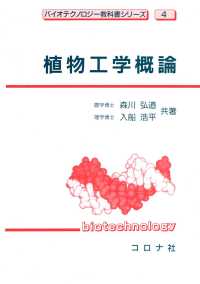- ホーム
- > 洋書
- > 英文書
- > Business / Economics
Full Description
With Artificial Intelligence (AI) reshaping how businesses operate, the integration of intelligent technologies into Knowledge Management (KM) processes offers new opportunities for optimizing data-driven decision-making and enhancing organizational performance.
AI-Driven Knowledge Management Processes explores KM as a critical element of business strategy and managerial practice, especially in an era of rapid AI adoption. Authors examine KM's foundational and advanced aspects through a managerial lens, highlighting how AI is reshaping contemporary KM practices, and delve into traditional KM strategies and cutting-edge AI applications. Each chapter is enriched with case studies and empirical research that showcase the real-world benefits and challenges of integrating AI into KM. From uncovering the theoretical underpinnings of KM to examining AI-driven innovations that create competitive advantages, this work offers actionable insights and perspectives on future developments. Authors address ethical, sustainability and managerial issues, equipping readers with the tools to navigate the complexities of AI-infused KM practices.
Providing a valuable resource for business leaders, academics, and students, this book support those looking to integrate AI into KM to drive strategic decision-making and operational efficiency. Merging traditional knowledge management practices with the latest AI advancements, it prepares readers to harness technology for innovative solutions, positioning their organizations for success in the modern business landscape.
Contents
Part 1. Introduction
Chapter 1. The New Era of Artificial Intelligence in Knowledge Management: Framing the Foundations of Intelligent Processes; Meir Russ and Miltiadis D. Lytras
Part 2. The Role of AI in Enhancing Knowledge Management Processes
Chapter 2. The Role of AI in Enhancing Knowledge Management Processes; Tamer Fahmy, Richa Minda, and Stephen Pak
Chapter 3. The Ethical and Managerial Implications of Integrating Generative Artificial Intelligence into Knowledge Management Processes; James Osabuohien Odia
Chapter 4. Artificial Intelligence-Based Risk Identification in Supervision Reports of the Ministry of Health; Avital Zadok and Daphne Ruth Raban
Part 3. AI and Knowledge Discovery: Techniques and Applications
Chapter 5. Effectively Informing Policies with Digital Twins, AI and Digital Technologies; Giovanna Di Marzo Serugendo
Chapter 6. The Complementary Roles of AI and Human Intelligence (HI) in Business Knowledge Management; Khoon Chin
Chapter 7. AI and Knowledge Management: Navigating the Misinformation Maze; Liz Kheng and Mark D. Schriml
Chapter 8. Transforming Knowledge Management with AI: Leveraging Retrieval-Augmented Generation (RAG) in Business Strategy; Yiyuan Ava Liu and Wanxi Li
Part 4. Machine Learning for Organizational Learning and Knowledge Sharing
Chapter 9. Learning and Development (L&D) Units and Organizational Culture: Impacts on GenAI Adoption in Israeli Organizations; Gila Kurtz, Eran Gal, Einav Yehilaviz, and Shachar Mahalal
Chapter 10. Enhancing Business Education with the Knowledge Management Mesosystem Model: A Framework for Active Learning, AI Integration, and Knowledge Sharing; Shanzhen Gao and Weizheng Gao
Part 5. Ethical Considerations in AI-Driven Knowledge Management
Chapter 11. Ethical Considerations in AI-Driven Knowledge Management: Navigating Challenges in the Modern Business Landscape; Theophilus Kofi Anyanful
Chapter 12. Who Can? AI Can! Enhancing Firms' Knowledge Management Capabilities Through an Ethical Implementation of Artificial Intelligence; Soode Vaezinejad, Christopher Michael Starkey, and Dara Schniederjans
Chapter 13. Biases and Ethical Considerations in AI-Driven Knowledge Management; Ruti Gafni, Boris Kantsepolsky, and Sofia Sherman
Part 6. Conclusions
Chapter 14. The Way Forward: A Roadmap for the Effective Adoption of AI-Driven Knowledge Management Strategies in Business; Miltiadis D. Lytras and Meir Russ






